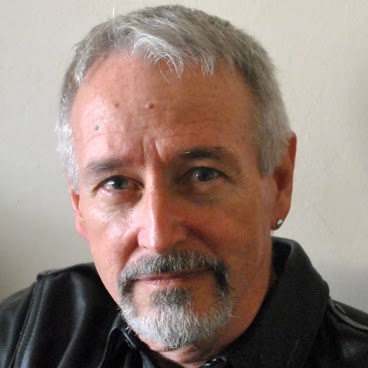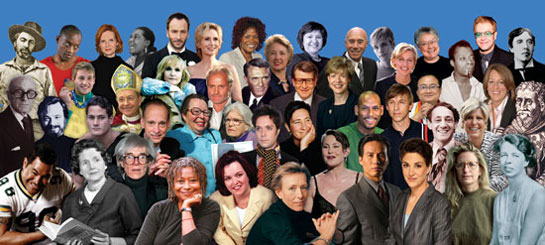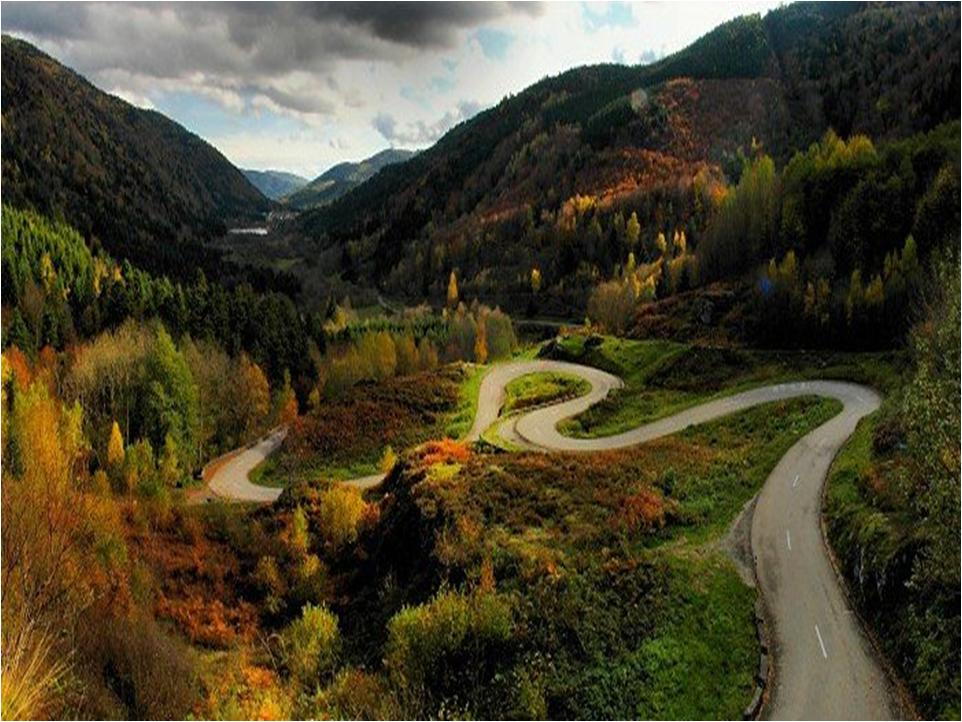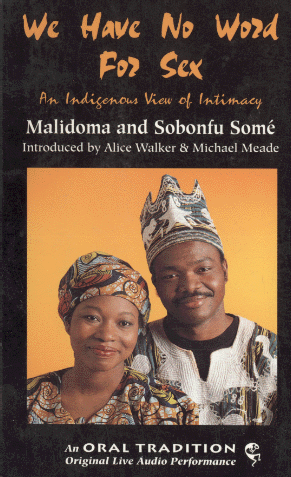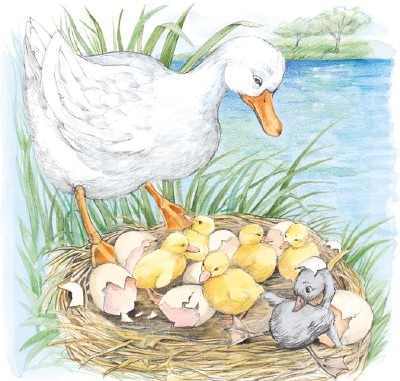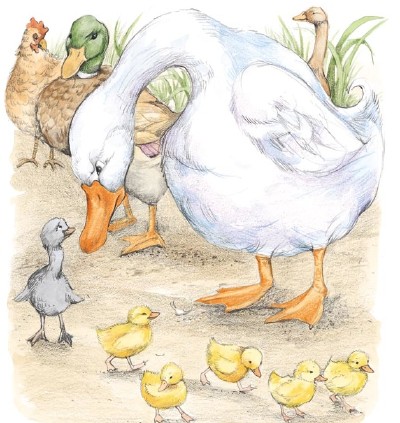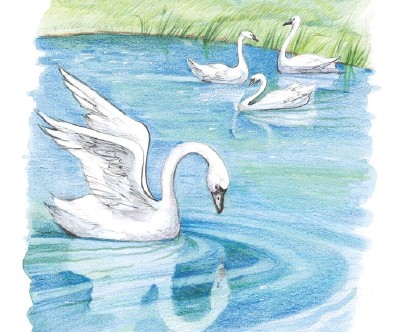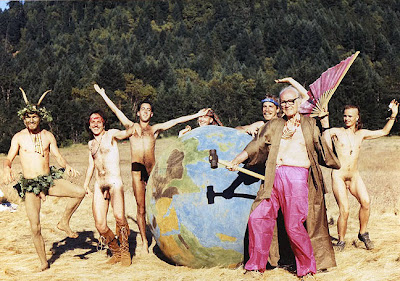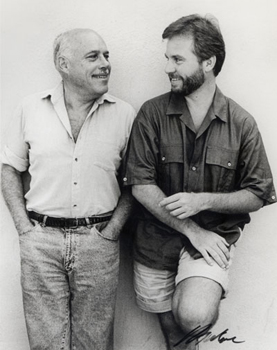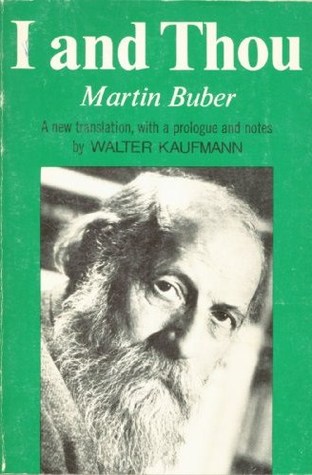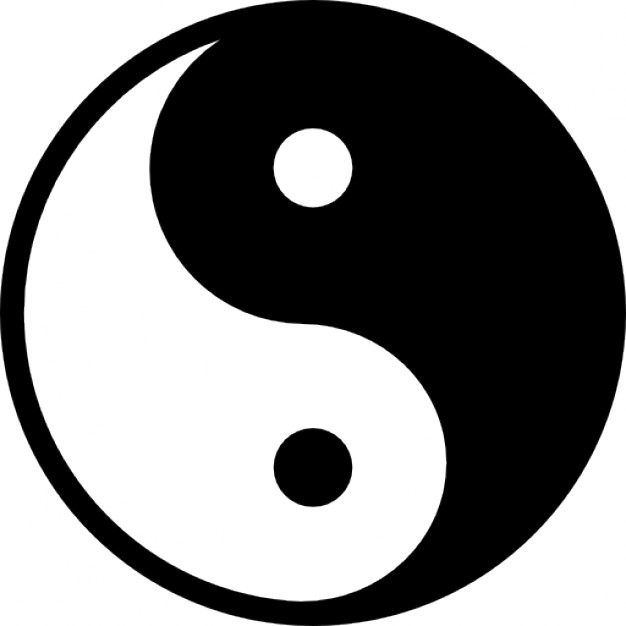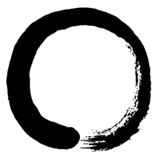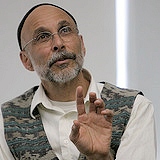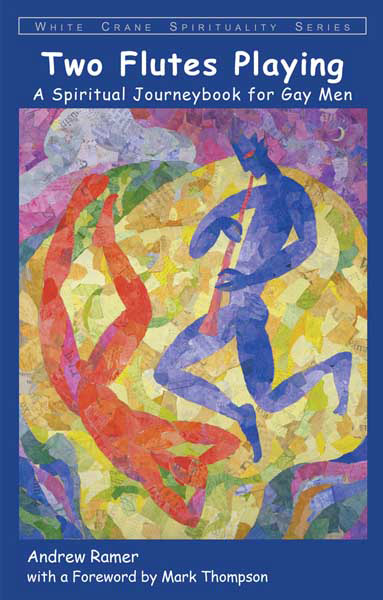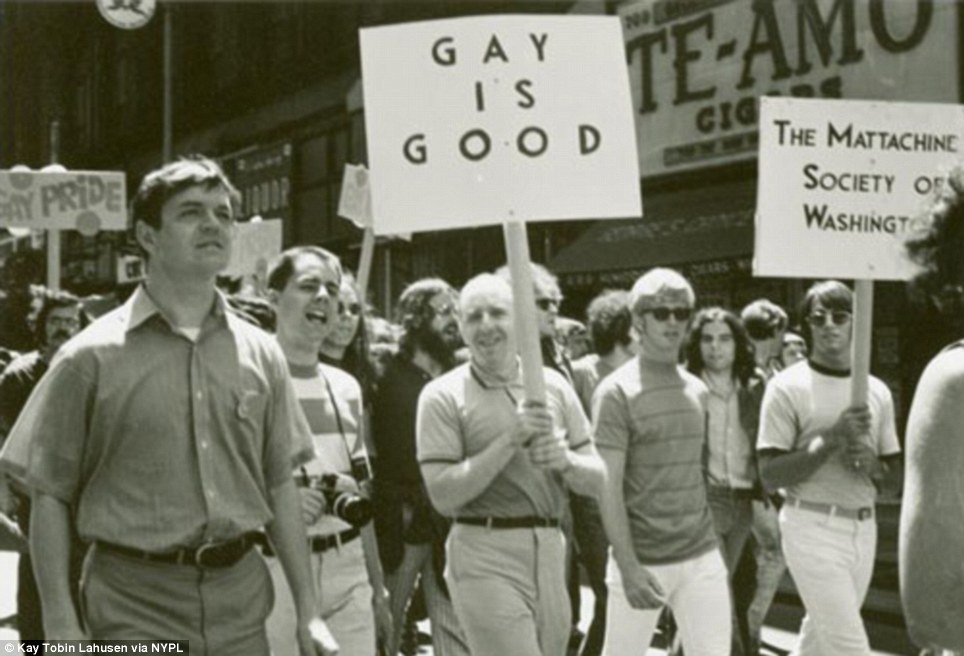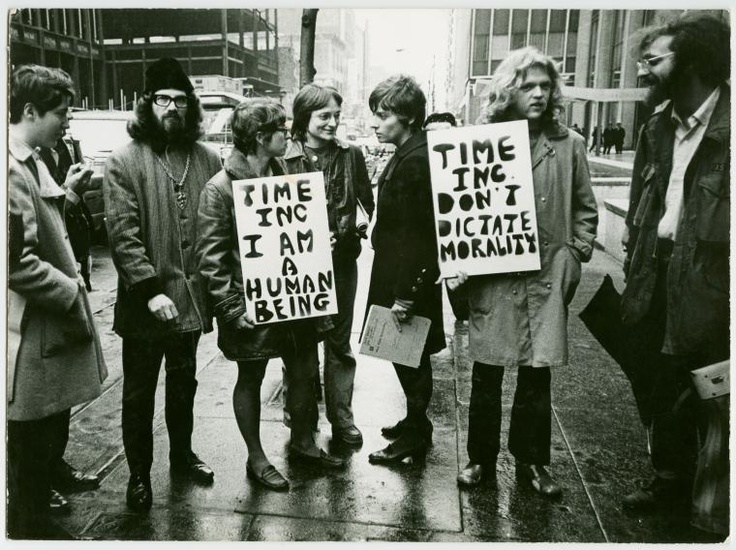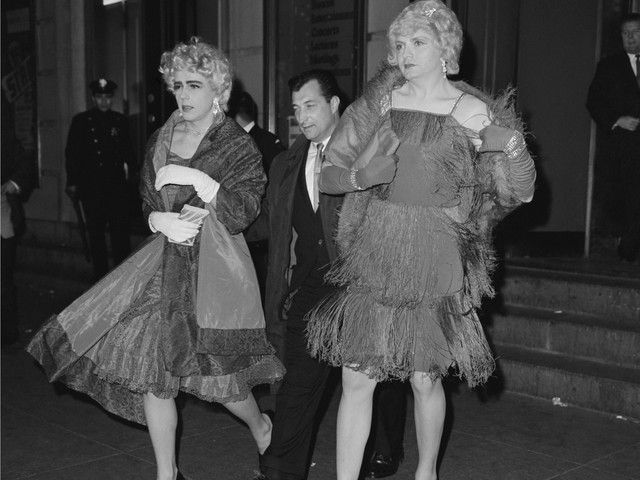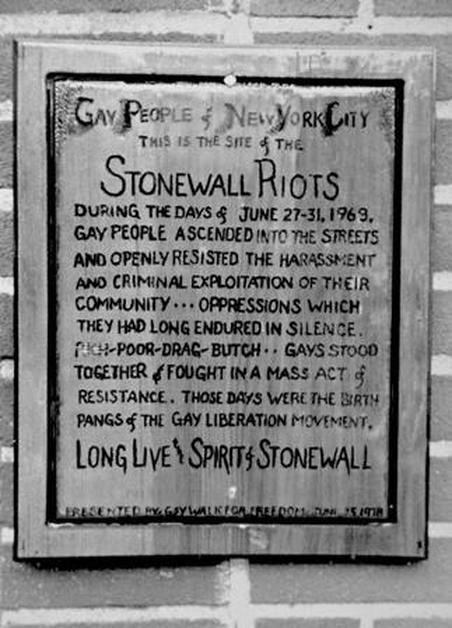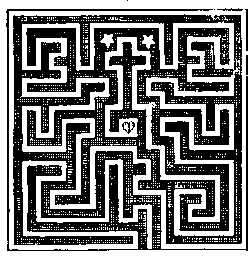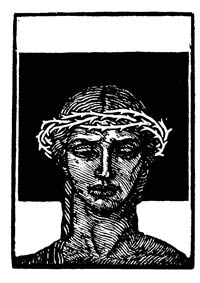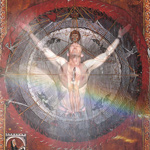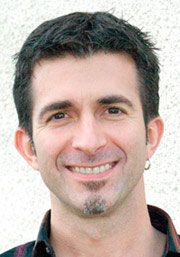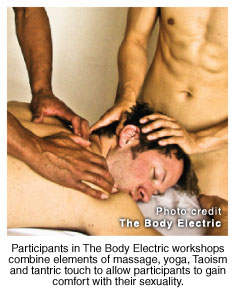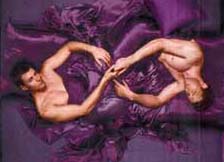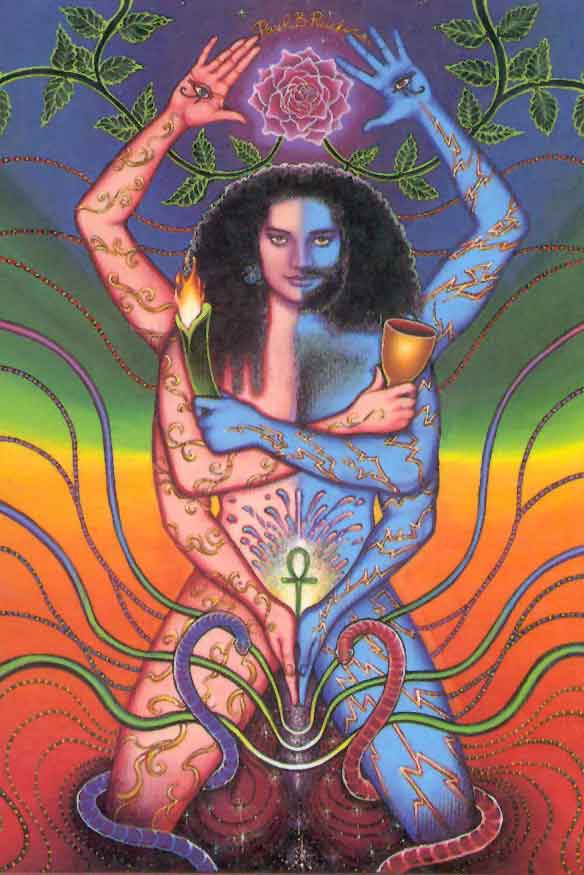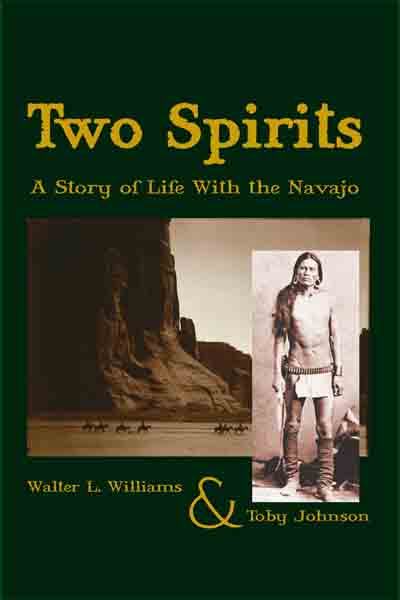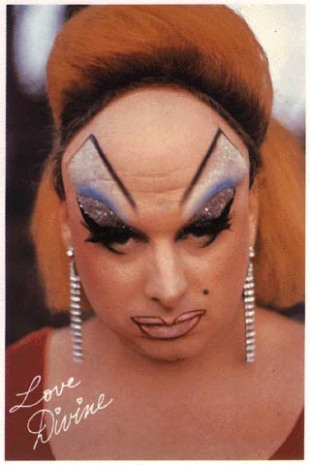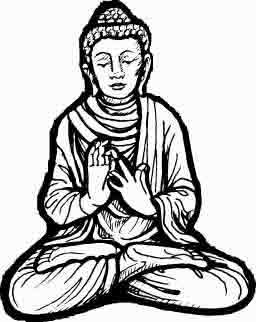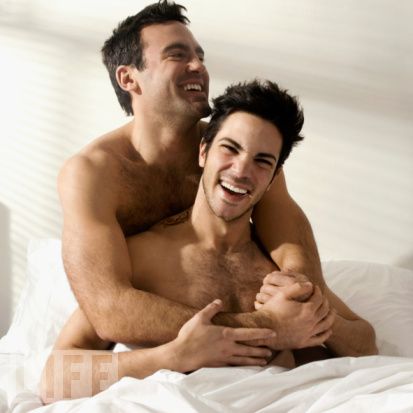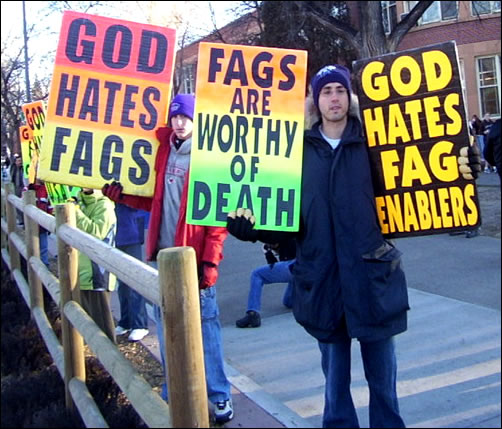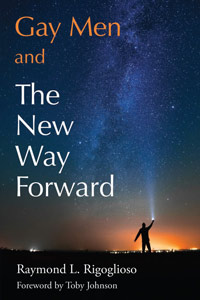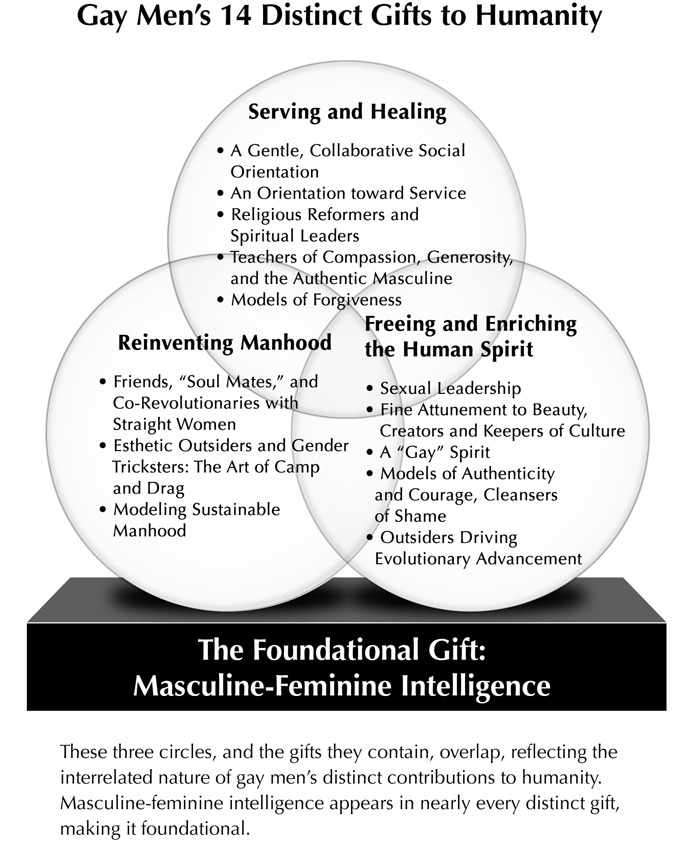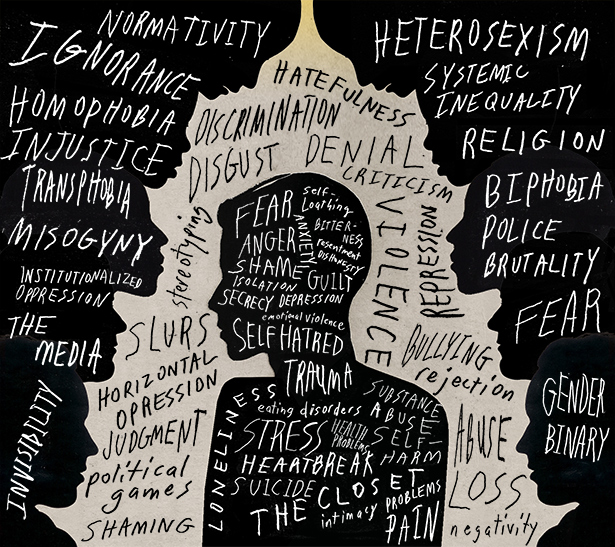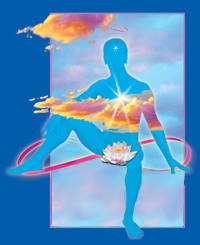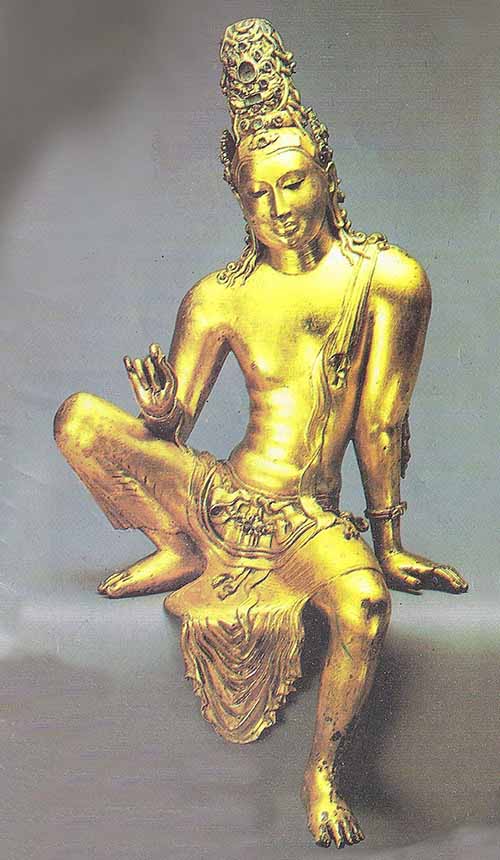![]()
The Hero's Journey
Everyone of us is a hero on a quest for our True Self.
The point of understanding this is to feel alive in the great web of life. "Spirituality" is about the larger context, the Big Picture.
I am going to talk about the concept of the Hero's Journey, about a specific "Gay Hero Journey" that shows up in individual lives AND also in the history of the movement, and I'm going to suggest how to understand all this as a "spiritual quest" for a kind of Enlightenment that arises from the consciousness created by being gay, queer, LGBTQIA+.
There are lots of new words and new connotations in the umbrella LGBTQIA+. They exist today because of the exploring and creating that was going on since the start of the Gay Rights Movement in 1950 with the founding of the Mattachine Society. These don't have to be competitive or confrontational.
The pattern is: start, rise a little, fall a little, run into obstacles, overcome them, rise a little more, fall more, be brave, overcome fear and resistance, have a great adventure and success, discover a secret or find a treasure, then relax, and come home bringing boons.
That’s the story of Dorothy in the Wonderful Land of Oz.
It's the story hunters have told around the fire when they come in from the hunt and warriors from the battle—and this has been going on a hundred-and-fifty-thousand years.
It’s the pattern of human sexual arousal. Seduction, overcoming obstacles, beginning foreplay, going into the altered state of passion, intromission, rising, holding back, rising, holding back, rising, rising, release, gradual decline, withdrawal, afterglow.
During any specific episode in life, it describes how we face events and resolve problems.
It's Elizabeth Kübler-Ross's Five Stages of Grief: Denial, Bargaining, Anger, Depression, Acceptance. Just like with the stages of grief, it helps to understand that you're going through a process.
And over a lifetime, it appears as the stages of psychological and personality development and maturation in each person’s life.
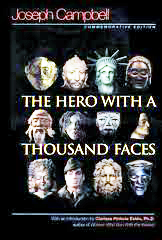
And, of course, it is the basic pattern for all stories—from fairy tales to great literary novels, folk stories to TV and movie dramas. Every episode of every TV show—from comedy to cop thriller—is structured by a plot that follows what Scott Meredith called “the plot skeleton” and Joseph Campbell "the hero’s journey."
And, as Joseph Campbell specifically observed in his masterwork The Hero with a Thousand Faces, it is the basis of all religion and myth—all saviors, gods and cosmogonies.
Joseph Campbell
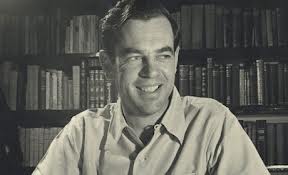
Some of you may know that I only partly tongue-in-cheek fancy myself “Joseph Campbell’s apostle to the gay community.” It isn’t so much Joe Campbell in particular that I want to champion, though he was, in fact, a wonderful fellow, but the stance of understanding religion and ultimate truth from a perspective over and above. I associate all this way of thinking with Campbell because he was my personal entry into it.
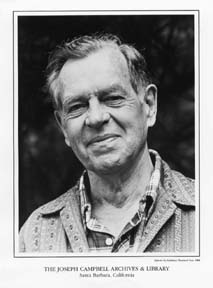
By happy chance, I got Joseph Campbell himself as the Wise Old Man of my own personal hero journey. I was part of the team that worked at many of his appearances in Northern California throughout the 1970s, and I carried on a correspondence with him in thoughtful, mostly handwritten, letters for some ten years.
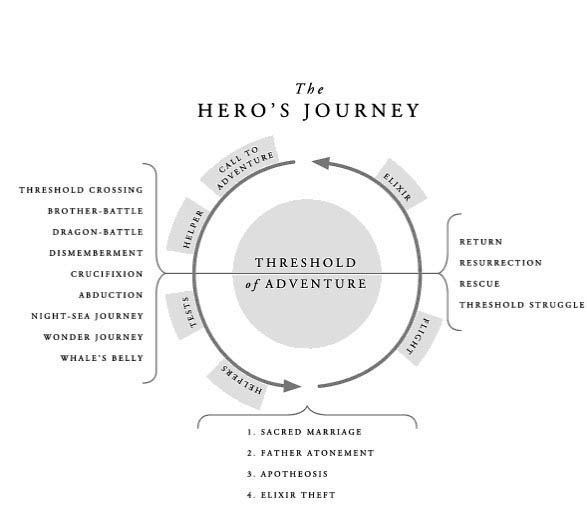
The mythological hero, setting forth from his common day hut or castle, is lured, carried away, or else voluntarily proceeds, to the threshold of adventure. There he encounters a shadow presence that guards the passage. The hero may defeat or conciliate this power and go alive into the kingdom of the dark (brother-battle, dragon-battle; offering, charm), or be slain by the opponent and descend in death (dismemberment, crucifixion). Beyond the threshold, then, the hero journeys through a world of unfamiliar yet strangely intimate forces, some of which severely threaten him (tests), some of which give magical aid (helpers). When he arrives at the nadir of the mythological round, he undergoes a supreme ordeal and gains his reward. The triumph may be represented as the hero's sexual union with the goddess mother of the world (sacred marriage), his recognition by the father-creator (father atonement), his own divinization (apotheosis), or again—if the powers have remained unfriendly to him his theft of the boon he came to gain (bride-theft, fire-theft); intrinsically it is an expansion of consciousness and therewith of being (illumination, transfiguration, freedom). The final work is that of the return. If the powers have blessed the hero, he now sets forth under their protection (emissary); if not, he flees and is pursued (transformation flight, obstacle flight). At the return threshold the transcendental powers must remain behind; the hero re-emerges from the kingdom of dread (return, resurrection). The boon that he brings restores the world (elixir).
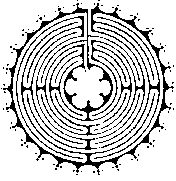
The labyrinth is a potent symbol of the journey inward, and back outward again. You move along a tortuous, winding path on which you often do not know whether you are walking forward or backward toward or from your goal. In the midst of it, you can feel lost and alone and helpless.
The Hero Journey, however, is not a maze. The path is known. Says Campbell:
We have not even to risk the adventure alone for the heroes of all time have gone before us. The labyrinth is thoroughly known ... we have only to follow the thread of the hero path.
And where we had thought to find an abomination we shall find a God. And where we had thought to slay another we shall slay ourselves. Where we had thought to travel outwards we shall come to the center of our own existence. And where we had thought to be alone we shall be with all the world.
The Power of Myth, Intro Credits
I wonder what Campbell meant by "abomination." The word, of course, means simply a taboo violation, something in today's teen slang we'd call "gross" (like picking your nose in public). But it is so often specifically applied to sexual variance. And its old-time biblical sound has made it seem especially egregious and offensive, even though it's just the opposite. Did Joseph Campbell understand that within homosexual experience, "we shall find a God"? Whatever he meant, we can certainly affirm that meaning for ourselves.
Gay Hero Journey
Gay novelist Lloyd A Meeker has several articles on the Internet about the Hero's Journey.
Meeker has a wonderful account of a "Gay Hero's Journey" in which he elucidates each of the stages of the Hero Cycle in the life of a young gay man he names Harold.
It's Harold discovering his homosexual feelings, struggling with then understanding them, falling in love, losing love, finding a counselor, coming out, being rejected, being bullied and humiliated, leaving home, learning about gay life and gay culture, experimenting with sex, drinking too much and getting into trouble, being rescued by a drag queen who shows him the way through the gay world, rejecting temptations to use sex for drugs and money, taking responsibility for his own life, buckling down and building a life, volunteering in a gay community organization, finding true love, reconciling with his parents and receiving their blessings on his relationship, and becoming a psychologist and guide himself.
It's a delightful presentation of the stages, with witty twists on the age-old mythological themes—like "the Goddess" being the worldly-wise drag queen with a heart of gold.
And it is also a very familiar and believable story, because Meeker's account of the gay hero "coming out" journey is so close to what almost all gay men—and with some variations, lesbians, bisexuals, trans* people and queers—go through.
One night [Harold] is reading something by Joseph Conrad: “Facing it, always facing it, that’s the way to get through. Face it.”
Every human being, of course, goes through the Hero Cycle of their whole life and the many mini-cycles that go on in each and virtually every phase of life. Every adventure, every episode in our lives follows this pattern.
The Restlessness within and the Absence of Guides
In two accompanying articles on the website, Meeker presents what he calls "Essential differences in a gay Hero's Journey." In Part One, Meeker notes that the real gay person (and the gay protagonist of a novel) experiences the Separation from the World and the Call to Adventure as arising within themselves.
Traditionally, the hero gets "called" by something outside him or herself: a letter arrives in the mail, or he or she is drafted, or an inheritance is bestowed, or a mysterious event happens that must be investigated.
But the gay hero starts with a restlessness within AND the restlessness is at the level of sex, love and romance. It is felt in the body, as the self. The restlessness may be with his or her own body—"There is something wrong with me."
He discovers he is living in a world in which he does not quite fit even, especially, in his own family. He or she may feel self-conscious, worried what other people think.
Meeker says the gay man's Great Wound is "not belonging." And in order to belong to something, he must go out to find it.
His role-models and heroes are not provided by society, culture, religion and family. The great accomplishments of homosexuals are mostly hidden. The guides and wayshowers won't come to him; he must find them.
This is why homosexuals, rightly!, relish discovering the real histories of people like Alexander the Great, Michaelangelo, Isaac Newton, Abraham Lincoln, or Greta Garbo, Marlene Dietrich and Cary Grant and Randolph Scott, etc.
Shape-shifters and Performers
In Part Two, Meeker notes that the gay hero "understands the familiar world from a perspective that is ideally equipped to bring outside-the-box thinking for change, insight, compassion and creativity. But it takes courage to do it." Such a gay hero most likely goes through an experience of being a shape-shifter.
This is generally not a quality of the traditional hero (though it might be a special power); indeed, part of being a male hero was boldly being who you are, the young straight man come to accomplish his mission, the warrior, the dragon-slayer.
The gay hero, on the other hand,—that is, most of us gay men as we have figured out how to live this life—learns to pretend and to be something he is not; he learns to pass. He can keep secrets.
This skill gives perspective. You learn how to perform—and to know you are doing it and to be able to control it.
This is a double-edged sword, he says, and the gay protagonist—that is, the gay person living the "right path"—must find an internally congruent, authentic way to belong when he or she returns.
The Long and Winding Road brings you back home.
Gate Keepers, Spiritual Connectors and Exemplars
In a separate article, titled Letter to a New Generation of Gate Keepers, Meeker writes to a young generation that has perhaps had an eaiser time of coming out as gay/queer, but still have a "hero task" of learning to make being gay a positive and contributing talent.
This is, of course, what so-called "Gay Spirituality" is about: recognizing how the natural traits and talents that go with being an outsider, at least in the sense of being a member of a minority, and with being freer about sex and gender roles can be recognized as spiritual gifts and spiritual practices.
Meeker recounts a little of his own life and hero journey to be the modern gay man that he now is; in that process he reports of the African Dagara peoples' notion that homosexuals and gender variant people were Gate Keepers who had an essential function in the life of the tribe—of maintaining the living connection between the earth and the spirit world.
Meeker proposes a series of virtues gay people ought to learn. In that sense, this third article completes the Hero Cycle by elucidating the boons the hero returns with.
Lloyd Meeker's advice:
Learn to listen to other people,
cultivate a sense of wonder,
be delighted,
be open,
practice kindness and friendship.
"You are gay for a reason—the Universe has entrusted you with stewardship of a certain kind of spiritual consciousness and power," says Meeker.
The Hero Journey as
Spiritual Quest
Transformation of Self
Hans Christian Andersen's fairy tale of the Ugly Duckling is an allegory about growing up gay. Maybe Andersen himself even knew and intended that.
It's a very popular story and applies to lots of children's growing up and finding their body changing, but it has specific meaning for queer people because it's about being "different" from your own family.
The cygnet raised among ducks, ashamed and outcast, has to discover his true identity, and when he does, he is transformed into a swan. The Gay Hero Journey is always about transformation and finding the True Self.
We have to learn to see our worlds differently from how we were taught. We have to understand sexuality differently. We have to perceive and value our body parts—our "private parts"—differently. We have to transform what we think homosexuality is. We have to "create something from nothing."
We have to change how we see ourselves. The transformation is about self and self-concept.
So changing how you see things and showing other people how to see things differently is a creative power and task of the gay hero.
Taking or Receiving your True Name
Transformation is signified by changing one's name. That's why monks and nuns take religious names, and Radical Faeries take Faerie names and, indeed, why traditionally women took their husbands' name—to signify change.
Through what he published in The Advocate as Culture Editor and which was then published as Gay Spirit: Myth & Meaning, Mark can rightly be thought of as the "Founder" of Gay Spirituality.
Radical Faerie co-founder Harry Hay,
a popular Marxist teacher in the 1940s,
"queers" the Communist hammer and sickle
at a 1987 gathering in Wolf Creek, Oregon.
Photo by Mark Thompson
Malcolm Boyd
June 8, 1923 - February 27, 2015
&
Mark Thompson
August 19, 1952 - August 11, 2016
This is also what political signifiers are about. Choosing to identify as homosexual or homophile or gay or LGBT or as queer or trans* or bi, as a rainbow child or proud but unlabelled—all are ways of expressing self-discovery and change.
Each of these terms, you can see, represent generational and cultural changes in how sexual and gender variance is understood.
Knowledge at each stage makes possible and expands knowledge at the next stage. Knowledge of homosexuality made possible "gay identity." "Gay" consciousness made possible the awareness of trans* consciousness. Layers of identity multiply. Transformation itself results in a self-fulfilling prophecy of more transformation.
In a way parallel to what Lloyd Meeker called "shape-shifting" in the individual sex and gender variant person, the reality and the terminology of LGBTQIA+ shape-shifts through time. This parallels the Foucaultian, Queer Theory idea that sexual identities are constructed rather than essential.
Heroes change their names or get new names as part of the stage of Initiation. And their world changes.
Discovering a New World
subject-SUBJECT Consciousness
Harry Hay (there in the photo of the Radical Faeries above in pink pants with the hammer), founder of the original Mattachine Society and then much later the Radical Faeries and an important voice in "gay consciousness," said that a major strength of homosexual experience is relating to other same-sexed people as "subjects" like yourself. We can understand each other in a way most straight people just don't. We share a secret understanding. We certainly understand each other at the level of sexuality and desire. Hay used the terms subject-SUBJECT and subject-object. He said most heterosexuals treat each other as "objects."
These parallel the terms created by the Jewish Existentialist philosopher Martin Buber: I-Thou and I-It. These were popular terms at the time for describing authentic, compassionate, understanding, respecting relationships, equal-to-equal, I-Thou.
Hay was intentionally contrasting homosexual and heterosexual relationships, wanting to give special dignity and respect to the homosexual at a time when homosexuals were not believed to be able to have interpersonal relationships at all.
Another way of saying that is that gay/queer people are attracted to sames, not opposites. There is an understanding and resonance between men and men and women and women.
Between men and women, there is difference.
Vive la difference.
Friction, frisson.
The "battle of the sexes" makes the world go round.
Those to whom difference is fundamental to reality naturally see the duality and polarity everywhere—The Knowledge of Good and Evil—, and opposite poles are perceived to be mutually exclusive and repulsive. Most of the "adversarial," "competitive" quality of human life arises from the heterosexual POV.
"Free Your Mind and the Rest Will Follow."
This transformation and name-changing/identity-changing can also be a transformation of the world—from one of duality, conflict and competition to one of oneness, harmony and cooperation.
These are "new-age," 21st century values that everybody is coming to honor. And they transcend the hetero-homo dichotomy that Hay was emphasizing back in the 50s.
What Hay might really have been referring to is the difference in relationship style between men and women. It's women who relate subject-to-subject, sister-to-sister. It's men who relate to others as sex-objects, competitors or objects of derision. Because homosexual men likely or potentially have more "womanliness," they are able to also relate sister-to-sister and lover-to-lover.
The implication of Hay's valorization of subject-SUBJECT relating is that all gay, queer and gender variant people have to make an effort to understand each other and not treat each other as objects. Men especially must be vigilant about not treating other men as "sex-objects."
Into an Alternate Reality
Heroes bravely go where no one has gone before. Being brave and doing what must be done, when it must be done, is what the hero has come for.
The hero enters a new reality with a new name. He or she or ze discovers a new history. It turns out there has been a whole gay history that has been hidden. And a whole world of gay/lesbian/trans* reality. Gay/queer culture.
And a whole world of gay literature and mythology. Sex and gender variant people have created new worlds in fiction and fantasy, sci-fi especially.
Andrew Ramer, for instance, has devised a whole "pre-history" that is part fiction, part traditional storytelling and part mystical revelation in such books as Two Flutes Playing and Queering the Text.
The Task: Telling the Truth about Sex
The Sexual Revolution, of course, was much bigger than just Gay Lib. And it was as much about achieving psychological health and personal wholeness as it was about having sex. GLBT people were generally perceived as warriors at the barricades. And telling the truth was one of the ways we fought.
Authenticity was the key value. Being honest about sex and being able to use words about sex is a hallmark of liberation. And it transforms how sex is experienced.
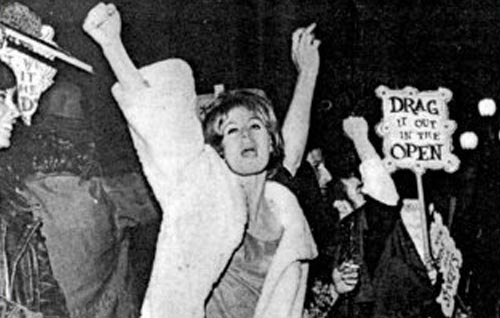
It took courage.
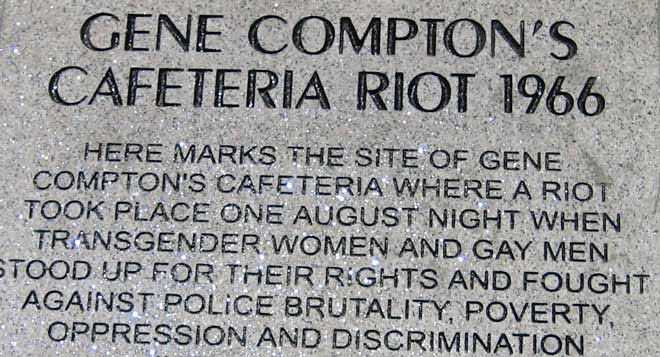
The Road of Trials
Religion, mythology, spirituality—all deal with suffering and misfortune. The hero finds the situation progressively increases in severity, matters become darker and more urgent, until finally he or she resolves the crisis through the heroic act. Resolving the crisis may mean enduring ordeal, being tested, even allowing oneself to be a victim, but now with transformed vision.
For the individual, the road of trials may be persecution or humiliation, losing a job, losing a lover, having to face personal misfortune and bad luck, maybe accident or disease.
"Hardships often prepare ordinary people for an extraordinary destiny."
—C.S. Lewis
For the gay community as a whole, this road of trials has certainly meant AIDS with all its layers, and grieving over lost friends and lovers. By participating and demanding and working for change, the terror of the early days is being resolved.
The Road of Trials—in an awful pun—might also be the Road of Hearings and Court Cases and political zaps and Candidates' Forums, and community organizing that was required for change to happen.
Reconciliation, Apotheosis and Sacred Marriage
Successful passage through the road of trials brings reward. In myths the hero often gets the damsel he has been sent to save or is rewarded by the King with the hand of his daughter in marriage. But the hero may also die in the process and be taken into heaven and made a god. Or, less dramatically, he may simply come home and find himself welcomed by the parents who'd rejected him.
It is telling that in the actual history of "Gay Lib," the major sign of success has been Same-Sex Marriage.
There are so many factors that have entered into the amazing changes in the last ten years. There's no one thing—though perhaps everybody coming out and making themselves visible is what changed public perception of homosexuality.
AIDS forced that visiblity—with movie hero Rock Hudson as the archetypal example.
And AIDS elicited compassion and respect. For many of the public who didn't really understand what homosexuality was at all, the fact that people stayed gay even in the face of AIDS was evidence that it wasn't just a choice those people made just so they could have more sex.
AIDS and the activism of caregiving it produced made "homosexuals" into three-dimensional, real people.
Apotheosis in the Erotic God
The stage of "Apotheosis" —becoming God— is the hero's discovery that he or she IS God or, in reverse, that God is he or she. Certainly, one of the boons that gay culture has granted us is the discovery of the Erotic God.
Spiritual teacher, retreat master, and now adventure guide, Hunter Flournoy speaks of finding the divine in our own bodies. Using the words of mystical Christianity, he says "The erotic body of Christ… is a visceral experience of God through our bodies, individually and collectively, modeled by Jesus, lived by the erotic Christian mystics throughout the ages, and felt directly in our own experience."
The Body Electric and the various spin-offs in modern day gay culture teach how to transform the experience of sexual arousal into something much more mystical. The boon is the revelation that: Sexuality and Spirituality are not opposed. Indeed, they belong together, each enhancing the other.
"Gay consciousness," attraction to sames, is a clue to oneness and harmony. "Non-duality," "non-binary thinking," seeing beyond polarities, seeing shades of gray instead of black and white, being compassionate, not law-enforcing—these can be hallmarks of the consciousness created by same-sex attraction. This is, I propose, the so-called "gay sensibility" in literature and art.
Such nondual awareness transcends the distinctions between right and wrong, good and bad, desirable and repulsive, self and other, God and the world.
"Non-dual" means not eating the apple, so not being thrown out of the Garden of Eden.
This is a popular idea in new religious consciousness. Maybe it's the future of religion. Gay/queer people can find it in our own experience of love.
God and the world, as separate and distinct, relate as complementary opposites. Beautiful together, like male and female, but different. God is an other. God is out there.
God and the world, as non-dual, relate as sames to sames. "God" experiences the world as us experiencing the world. God is in our bodies.
As you are reaching the point of ejaculatory inevitability, think "Here comes God." And as you're coming, think "May all beings be happy. May all beings be free."
Two Spirits
Above is an alchemical image of the union of male and female in one physical body. It's a heterosexual image in Alchemy as the sacred union between man and woman in coitus, but it also captures one of the ideas in modern LGBTQ spiritual thinking, that of the Two-Spirit.
This is a notion in shamanic religions worldwide and, of particular interest to us in modern America, in Native American cultures on this continent long before the Europeans came. Shamans discover they possess the spirit of Man and the spirit of Woman. And are blessed with powers of healing and of vision.
A novel about a fictional Navajo Two-Spirit Person by Walter L. Williams & Toby Johnson
The story invokes Navajo spiritual wisdom to speak of "ripples in the spirit field" which are the consequences of our lives that expand out beyond individuals into the collective world.
This is a mythic theme that particularly resonates with the very current awareness of Transgender issues and trans* identities.
Two-Spirit Persons have "spiritual powers."
It is not without meaning that Harris Glenn Milstead became Divine.
Herein is a pun and a clue.
The Return, Bearing Boons
The hero is transformed by his or her experience and returns to the place where he started changed. He brings gifts, perhaps a treasure or a healing elixir or new wisdom. He has powers.
The superhero powers in myth are really reminders of our "power" to create and recreate the world of our experience. The trick is to recognize your "power," intend the world to be the way it should be, but resist nothing, embrace everything, joyfully participate in the sorrows of the world, play the game, contribute to the process and live in such a loving way that your own life works and people love you and you love them and events unfold smoothly around you. Put out good vibes.
The Boon: Modern Hero Discovers the Nature of Truth
Spiritual, not necessarily religiousCampbell says the modern hero—that is, the one who faces the great mysteries and conundrums of life and seeks to help humanity AND who knows he is doing it because he understands what being a hero is—brings back the wisdom of seeing through the myths and beliefs and prejudices that hold the old world together.
Not necessarily anti-religious
He or she has left the village compound and gone up into a higher reality and seen how much bigger life is. He returns with the news that there are wonders up ahead, that the road is safe, that there's a passage.
What is evolving in consciousness and culture today is the awareness of that these legends and myths—and religious doctrines—are really about the human mind and how the mind generates the world of experience. The modern hero has to discover his own "oneness" with the creative power that had been mythologized as "God." This isn't necessarily to deny God but to say that we can relate to God from within rather that through an anthropomorphization projected outward. It's mystical, not objective.
And because we can see all the cultures and societies and religions and mythological traditions around the world, we see what they are.
We can become aware of the nature of religion from outside. In fact, we have to. What we see is that for any one religion to be true, all must be true, and that means religious truth is different from scientific, historical and factual truth. That is an incredibly liberating discovery. We can "create our own religions." And we do.
The truth in the religions is metaphorical, more than historical. The truth of a religious doctrine is measured in the positive, transformational power it holds for believers, not facts about events in the past or metaphysical structures or what's written in Scriptures and ancient texts.
All descriptions are true, but none of them is right. None is complete. All myths are true, but for that reason you have to rise to a higher perspective from which that can be so.
Campbell’s wonderful retort to the accusation he must be an atheist was:
“Anyone who believes in as many gods as I do can hardly be called an atheist.”
But that’s an entirely different kind of not being an atheist. Indeed, such an overview includes being atheist too—or nontheist to use the Buddhistic term for transcending literal belief in the myths.
Modern Gay Hero Discovers This for the World
And this insight is one that saves sexual and gender variant people from the past. Because we've had to gain a perspective on ourselves to understand our variance, we are naturals for this perspective on religion and popular belief.
We are free from literal belief, "the Old Law." We can find our sexuality is good and is part of how we experience "God" and the meaning of our lives.
This is the boon the individual gay hero brings home to him or herself.
A kind of enlightenment.
And because sexual and gender issues raise the consciousness of the whole society, our issues force religion to grow and evolve. Everybody in America now gets exposed to the contradiction between enforcing one ancient biblical taboo against homosexual sex while ignoring all the myriad of other outdated taboos in the same text.
Everybody has to notice how crazy it sounds to blame hurricanes on homosexuals and how contradictory "God Hates Fags" is to Jesus's teaching about loving your neighbor, treating others as you would have others treat you AND to the American founding tenet that all… are created equal and endowed with the right to pursue happiness.
Gay rights, trans* rights, women's rights—these all challenge religion's legitimacy. And the religions have to adapt and evolve and become more inclusive. That's good for them.
Gay spiritual writer Christian de la Huerta calls this phenomenon gay people's role as Catalytic Transformers.
In fact, by our presence as sex and gender role nonconformists, we've opened the possibility for everybody to be more free and authentic. "Straight men" don't have to fear appearing gay. It's amazing how accepting modern society is.
Gay activism has been particularly successful within churches. Most church-going people really are well-motivated and churches do a lot of good. Dealing with being "affirming congregations" has opened people's eyes and made them better Christians, Jews, Buddhists, etc., etc.
Our gay/queer/gender variant task is to reframe how we understand our sexuality. Our "spiritual destiny" is the set of ideas and beliefs that induce that transformation—"straw into gold."
Transforming the Meaning of Gay/Queer
Raymond Rigoglioso is a social worker, coach, mentor, "spiritual teacher" now based in Provincetown. His book Gay Men and the New Way Forward is about the "14 Distinctive Gay Male Gifts," i.e., personality traits and virtues, that gay men self-report in his Gay Men of Wisdom groups. The book is about how gay men can change our self-concepts and attitudes about life and about homosexuality to be more true and more life-positive and affirmative. (I have a Foreword about how self-fulfilling prophecy transforms the world—"Revolution through Consciousness-change.")
This list is descriptive—in the sense that it's based in self-reporting. And it is prescriptive—in the sense that's it describes how gay men "ought" to be.
Slaying the Dragon
The demon the gay hero must conquer is homophobia. Internalized homophobia causes us to hate ourselves as homosexuals and to discount our powers.
Externalized homophobia—though you don't hear that expression—is what the Jungians call The Shadow; it's homosexuals disapproving and "hating" other homosexuals and gender variant people. What we "hate" and are ashamed of in ourselves, we project onto others and hate it in them and blame them, not ourselves, for it.
In the book Shift Your Mood, pychotherapist and Mindfulness teacher, Rik Isensee writes of the Golden Shadow, meaning that we canreverse the Shadow. We can recognize the good qualities in others as qualities of ourselves because we can see them and recognize our own goodness (and reason not to hate ourselves) AND we can project our own goodness onto others, intentionally giving others the "benefit of the doubt" that we would hope others would accord to us, not making other people wrong, and seeing in them the good qualities we want in the world. We can see the "God" in other people.
Namaste
"As your stories of who you think you are drop away [through mindfulness practice], you discover that you are awareness itself, you are Christ consciousness, you are a realized buddha, you are Brahman, Atman, Quan Yin, Mary, the Tao, nature, or the Great Spirit—Tat Tvam Asi, Thou art That—and so is everyone else.
"All the various "names of God" can be understood as metaphors or expressions of consciousness, wholeness, and being. They come from many different traditions, and serve as an approximation of that ineffable quality, "a finger pointing toward the moon," humanity's various attempts at expressing the essence of what you actually are.
"Ah yes, this is who I am, in this moment. I am that wholeness, stillness, or even a fireball of energy. This is home, the unconditioned, the inner sanctuary, the freedom to be as I am. And at the same time, to see clearly that separation is an illusion: we are all connected in a vast web of life and buzzing energetic motion. I can learn to trust in my own responsiveness, through a compassionate acknowledgment of others.
"You are the source of Love. You are the source of Wisdom.
"You already are what you are seeking!"
Rik Isensee, Shift Your Mood
The goal of all spiritualities is to experience
being in heaven now.
Here's the cover art from Gay Perspective created by Peter Grahame, showing a gay man in the classic pose of the Bodhisattva Avalokiteshvara/Quan Yin.
Avalokiteshvara—the world savior in Mahayana Buddhism—this cute, lovable, androgynous young man who is loved by everybody who knows him and who sits out in the garden barechested in a relaxed half-lotus posture, wearing women's jewelry—has "saved the world" by taking on everybody's incarnation for them so they could go on into nirvana. So ALL of us are incarnations of the bodhisattva, so there isn't even a dualism of "I" and "other." The spirituality of the Bodhisattva is called "The Way of Joyful Participation in the Sorrows of the World."
The three wonders of the Bodhisattva1) Ze is both male and female demonstrating the best qualities of each sex and gender;
2) to the Bodhisattva, there is no distinction between time and eternity, between samsara and nirvana: this, our present life, IS heaven; and
3) here's the kicker—the Third Wonder is that the first two wonders are the same. Seeing beyond gender roles is seeing heaven now.
Joseph Campbell said, "People ask me: 'Do you have optimism about the world, about how terrible it is?' And I say, 'It's great just the way it is.'"
“If you follow your bliss,” he said, "you put yourself on a kind of track that has been there all the while, waiting for you, and the life that you ought to be living is the one you are living… Follow your bliss and don’t be afraid and doors will open where you didn't know there were going to be doors.”
“People say that what we’re all seeking is a meaning for life. I don’t think that’s what we’re really seeking. I think that what we’re seeking is an experience of being alive, so that our life experiences on the purely physical plane will have resonances with our own innermost being and reality, so that we actually feel the rapture of being alive.”
I use the term "spirituality" to mean a set of themes, ideas, and practices that appeal to particular types of people and show direction and give solace, meaning and joy.
For example, one can speak of a Jesuit spirituality, based on a model of military life; a Franciscan spirituality, based on love of nature and simplicity; a husbandry or hunter's spirituality, based on killing animals to provide necessary food; a vegan spirituality, based on respect for all sentient lives.
Women's spiritualities, for instance, include lunar references to draw in the female experience of menstruation and the monthly passage of blood. Men's spiritualities include doing and working and sexual imagery to draw in the male experience of needing to jettison reproductive fluid daily.
Heterosexual/married spiritualities include notions of complementarity and completion and balance of binary forces as well as valorization of reproduction, parenting, and domesticity and stability.
So similarly, gay/queer spiritualities include valorization of being outsiders, explanations of sex and pleasure beyond reproductive imperatives, the beauty and symmetry of sames, the balancing of polarities within self, the call to adventure and risk, free of parental responsibilities, following the life of the wanderer and vagabond.
Bisexual spiritualities, the freedom to choose and to change and to live beyond excluding alternatives; and trans* spiritualities, the quest for authentic experience of self and the power of will to change the status quo.
These are not exclusive of one another, nor in competition with one another. Such spiritualities differ from person to person the same way as favorite songs or meaningful lines of poetry or sacred scripture.
Some people like John 3:15, some the 23rd Psalm, others Walt Whitman's Song of Myself. All spiritualities aim at giving meaning to life and expanding consciousness beyond self for the sake of happiness and the continued evolution of human consciousness itself. Human life is about exploring consciousness. The great religious, mythical and spiritual traditions provide language and potent symbols, metaphors and imagery for that exploration. Everyone of us is a hero on a quest for our True Self.

